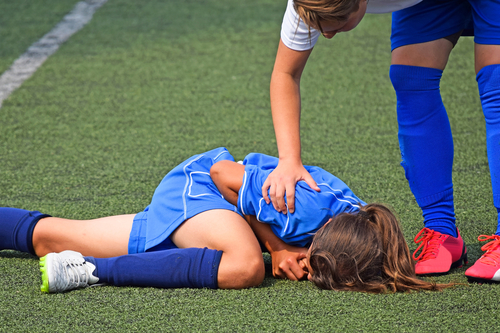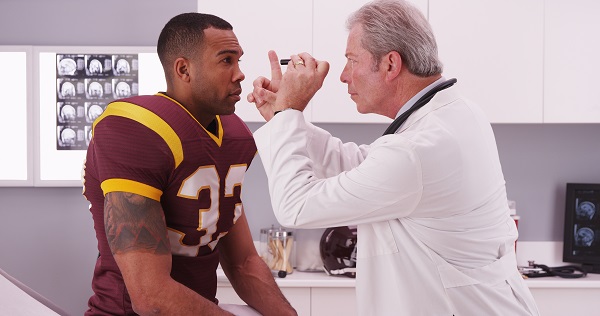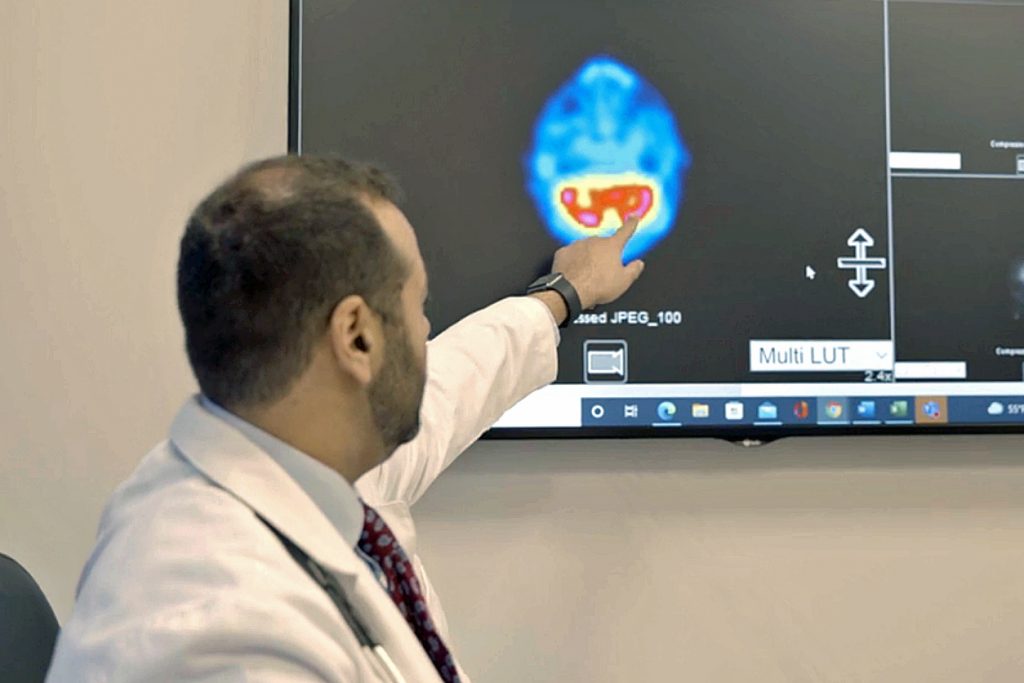Treatment for Children and Adolescents with Traumatic Brain Injury (TBI) and PCS
Children and adolescents experiencing the effects of traumatic brain injury (TBI), post-concussion syndrome, and other brain performance problems have the opportunity for a better future with the right approach to treatment. Explore an effective treatment for TBI offered by Aviv Clinics Dubai:
Aviv Clinics Dubai Launches Highly Specialized Youth Medical Program to Assess and Treat TBI and Brain Performance Problems in Children and Adolescents
-
- The program uses Hyperbaric Oxygen Therapy (HBOT) to improve cognitive, emotional, and behavioral symptoms of youth suffering from specific brain-related issues.
-
- The new youth treatment program is backed by a first-of-its-kind study validating the Aviv HBOT protocol as an effective treatment for children suffering from persistent post-concussion syndrome.
-
- The youth program can also help improve the quality of life in children, aged between 8 to 15 years, suffering from cerebral palsy, Traumatic Brain Injury (TBI) and stroke.
- The youth program can also help improve the quality of life in children, aged between 8 to 15 years, suffering from cerebral palsy, Traumatic Brain Injury (TBI) and stroke.
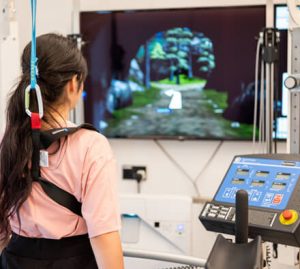
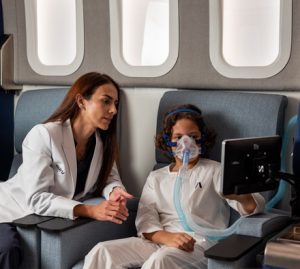
Aviv Clinics Dubai, a wholly-owned subsidiary of DP World, has opened a new wing at its JLT-based specialty brain health and performance center dedicated to a breakthrough Youth Medical Program that uses hyperbaric medicine to treat specific brain injuries in children and youth between the ages of 8 and 15.
The program specializes in the treatment of multiple disorders including cerebral palsy (a childhood motor disorder in childhood caused by brain injury due to lack of oxygen or blood supply), Traumatic Brain Injury (sudden damage to the brain caused by a blow or jolt to the head), and strokes (when the blood supply to part of the brain is cut off, because of a blockage or a blood vessel rupture).
The Aviv Youth Medical Program is the focus of a new study, published in Nature Scientific Reports, which shows the effectiveness of Hyperbaric treatment in healing damaged brain tissue and alleviating symptoms in children experiencing persistent post-concussion syndrome (PPCS), where concussion symptoms continue beyond the expected recovery period.
The study, conducted at the Sagol Center for Hyperbaric Medicine and Research at Shamir Medical Center, suggests that HBOT improves cognitive and behavioral function, as well as quality of life in pediatric patients suffering from PPCS, even years after receiving their traumatic injury.
The Aviv Youth Medical Program treatment starts with a comprehensive three-day medical, physiological, and mental assessment carried out by Aviv-certified medical staff including pediatricians, pediatric neuropsychologists, physical therapists, speech therapists, occupational therapists, and nurses. This includes the most advanced brain imaging tests suited to the child’s needs, such as perfusion MRI, and SPECT.
After analyzing the results of the in-depth assessment, children undergo HBOT sessions five days a week for 12 weeks – 60 consecutive one-hour sessions in total. Alongside the HBOT sessions, the patient will receive personalized cognitive and physical training designed to maximize the effects of the rehabilitation. At the end of the treatment, tests are repeated and compared with the results of the initial assessment.
“The diagnosis and treatment of post-concussion syndrome in children is a critical issue that physicians and researchers have struggled with, to the detriment of the children,” said Dr. Shai Efrati, Medical Director of the Sagol Center for Hyperbaric Medicine and Research and Shamir Medical Center, and Chair of Aviv Scientific’s Medical Advisory Board.
“For the first time, we have demonstrated an effective treatment for pediatric PPCS, whether the injury occurred six months or 10 years ago. This discovery and the launch of our new Youth Medical Program offers hope to thousands of families watching their children suffer from unrelenting symptoms.”
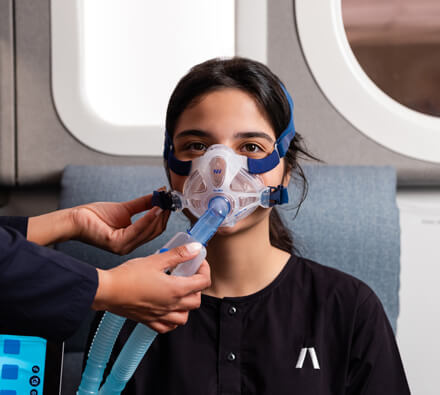
Upon completion of the study, researchers found that children treated with HBOT experienced a significant improvement in cognitive function, including the general cognitive score, memory, and executive function (ability to plan, prioritize tasks, and complete complex goal-directed behaviors), compared to the untreated children.
Other PPCS symptoms that improved include behavioral symptoms such as hyperactivity, and, perhaps most strikingly, the study revealed parallel structural brain changes, as seen on MRI, in the areas of the brain known to be affected by TBI leading to cognitive dysfunction and other symptoms of PPCS.
“Working in collaboration with DP World, we are able to bring to Dubai and the UAE medical community this highly specialized brain performance program grounded in more than 15 years of research and powered by truly state-of-the-art technology. As this study shows, we have the potential to give new hope to our young people and their families through the ability to diagnose and treat what can be debilitating symptoms of TBI, as well as other common brain disorders such as Cerebral Palsy and strokes. At the same time, we are able to contribute to advancing both Dubai’s and the UAE’s positions as global innovators and hubs for med tech and medical tourism,” said Mike Frayne, CEO of Aviv Clinics Dubai.
The same treatment protocol conducted during this study will be adopted in the youth wing at Aviv Clinics in Dubai. It will be administered under the same strict protocols, with additional comprehensive cognitive and physical training support for the various conditions and symptoms addressed by Aviv including concussion and TBI, and more. Aviv Clinic’s new Youth Medical Program is located in a dedicated wing of the 7,000-square-meter, state-of-the-art brain health and performance clinic in Dubai’s JLT.
If your child needs treatment for TBI symptoms or other brain conditions, we encourage you to learn more about the Youth Medical Program at Aviv Clinics Dubai by DP World.
Using Hyperbaric Oxygen Therapy to Address TBI and Concussion
Head injuries are much more common than one might think. According to the National Institutes of Health (NIH), an estimated 1.7 million Americans sustain a TBI each year. The Centers for Disease Control and Prevention (CDC) reports that there were over 64,000 TBI-related deaths in 2020, which equates to more than 175 brain injury-related deaths every day.
Those most affected include adolescents aged 15-19 and adults older than 65. Among seniors, falls are the most common cause of TBIs—a pervasive problem that can be mitigated with a few key strategies.
Yet, despite how pervasive TBIs are, many people don’t realize when they’re experiencing the “traumatic” incident. At one time, a mild traumatic brain injury (mTBI), which many know simply as a concussion, was actually thought to be a benign event. With much research, experts now know that even small, repeated injuries to the brain can have significant effects. These injuries can contribute to adverse neuropsychological outcomes—both acutely and long-term.
For example, in the moment, a concussion might cause dizziness, ringing in the ears, blurred vision, and vomiting. But over time, that same injury or repeated injuries may contribute to ongoing symptoms, such as chronic headaches, trouble concentrating or thinking clearly, memory problems, poor sleep, depression, anxiety, and irritability. Some people may not even connect an injury that happened years ago with their current symptoms, which can make it difficult to properly diagnose a TBI or post-concussion syndrome.
Unfortunately, the incidence of TBI and concussion persists. Per the Brain Injury Association of America, cumulative evidence shows that an estimated 5.3 million men, women, and children are living with a permanent TBI-related disability in the U.S. today.
Yet, does it have to be “permanent”?
HBOT’s Role in Relieving TBI Symptoms
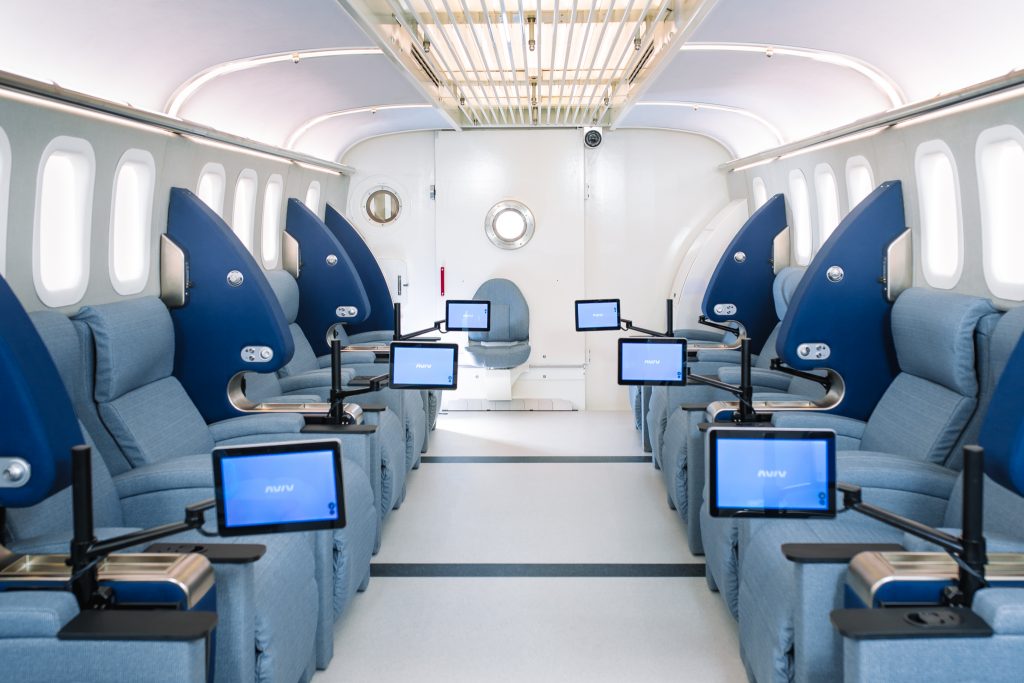
Dedicated research into brain healing reveals a therapy that produces positive results in cases of TBI and post-concussion syndrome. Hyperbaric oxygen therapy (HBOT) has historically been accepted as an effective treatment for medical issues like wound healing, severe infections, and decompression sickness. For some time, HBOT had not been explored much beyond those applications.
However, research in the last two decades reveals that HBOT, in combination with certain cognitive, nutritional, and physiological protocols, is able to repair areas of the brain that have been damaged due to TBI and concussion, as well as stroke, post-traumatic stress disorder, fibromyalgia, Lyme disease, and other neurological conditions.
What Results Can Individuals Expect?
To understand how HBOT works to address TBI and post-concussion damage, it’s important to know what changes occur in the brain during those injuries. Structural damage indicates a physical impact on the brain, such as bleeding. Metabolic damage is present when the brain’s cells are affected.
Traditional scans like CT and MRI may not be able to detect metabolic damage, especially if an injury occurred years ago. More advanced scans—like functional MRI and SPECT—are better able to identify areas of the brain that may be producing chronic post-concussion symptoms.
Applying HBOT and the unique protocols of the Aviv Medical Program yields multiple changes in the brain:
- New blood vessel formation (angiogenesis)
- New and stronger neural connections
- Stem cell production
These neural, vascular, and cellular changes contribute to cognitive improvements in memory, executive function, attention, processing speed, and spatial memory. Individuals with brain-based motor skill challenges also benefit from this comprehensive therapy.
Elements of the Aviv Medical Program also include cognitive therapy, strength and physical training, and nutritional coaching. The physiological and nutritional aspects of Aviv Clinics’ customized protocol elicit enhancements such as greater aerobic fitness, higher energy levels, improved sleep, and reduced pain. Overall, individuals report a significant improvement in their quality of life after completing the program
Bottom Line

If you’ve ever been in a car accident, fallen off a horse, or had “your bell rung” playing sports, you may have experienced a brain injury that could still be impacting your health. The Aviv Medical Program can help ease your symptoms.
If you or a loved one suspects a TBI or concussion has left lingering symptoms, contact us to learn more about how investing 90 days into treatment could change the rest of your life.
Your Comprehensive Guide to Post-Concussion Syndrome (PCS) Symptoms
If you or your loved one believes they have post-concussion syndrome (PCS), rest assured, the Aviv Clinics team is here to help. We understand how debilitating living with PCS symptoms can be. We also understand how challenging it can be to find answers and solutions.
In this comprehensive guide, you’ll find essential research-backed details intended to help you better comprehend your condition and the types of treatment options available to you. If you have any questions along the way, reach out to our team.
What Is PCS?
PCS is a condition where concussion symptoms continue beyond the expected recovery period.
According to Aviv’s medical team, when concussion symptoms last longer than two weeks, doctors will typically diagnose this as PCS.
PCS can develop after a mild, moderate, or severe traumatic brain injury (TBI) from activities such as a vehicle accident, fall, sports injury, and more.
What Are the Symptoms of PCS?
The symptoms of PCS can be divided into four categories:
1. Physical
Physical PCS symptoms are the most commonly recognized signs. Individuals with PCS may experience debilitating pain and discomfort such as:
- Headaches
- Dizziness
- Nausea
- Vomiting
- Trouble balancing
- Vision problems
2. Cognitive
Cognitive issues are often the PCS symptoms that compel patients to seek medical advice. Cognitive PCS symptoms include:
- Feeling mentally foggy
- Feeling slowed down
- Having difficulty concentrating
- Having trouble remembering
- Being forgetful of recent information and conversations
- Experiencing confusion about recent events
- Answering questions slowly
3. Psychological/Emotional
Psychological and emotional symptoms can often be difficult to identify and associate with head injuries. Many people tend to overlook these emotional changes when in reality, these changes can be a manifestation of PCS. These psychological/emotional changes include:
- Irritability
- Sadness
- Nervousness
- Anxiety
- Depression
- More emotional in general
4. Sleep
Last but not least, PCS symptoms can manifest in your sleeping patterns. For example, those with PCS may:
- Feel drowsier than normal
- Sleep more than usual
- Sleep less than usual
- Have trouble falling asleep
If you are experiencing PCS symptoms, contact our team of certified medical professionals today.
PCS Symptoms: Why and How They Happen
When someone experiences a traumatic brain injury (TBI), this blow or jolt to the head makes the head and brain move back and forth rapidly causing sheer force trauma to connective blood vessels and cells in the brain. This sudden movement can:
- Disrupt blood flow to specific brain regions
- Trigger chemical changes in the brain
- Stretch and damage brain cells
- These activities put stress on your brain and inhibit it from functioning normally.
Where the damage takes place also plays a relevant role in the type of PCS symptoms that occur.
For example, when head trauma inflicts damage to the frontal lobe of your brain—the area that manages emotional expression, focus, attention, and memory—this may stimulate emotional/behavioral changes and cognitive shifts.
How Soon Can Symptoms of PCS Start?
Symptoms of PCS start to show weeks after concussion when a concussion or TBI survivor just isn’t getting better. Over time, symptoms may not go away or may exacerbate. Symptoms can also appear later on in life.
How Long Can Symptoms of PCS Last?
PCS symptoms can last anywhere from weeks to years. The sooner you address your symptoms and get help, the more likely you’ll be able to get back to your normal activities, and for some people, get back to your normal personality traits. There are risks of waiting too long to treat your post-concussion syndrome, which brings us to our next point.
What Are the Consequences of Waiting Too Long to Treat PCS Symptoms?
PCS symptoms can turn permanent if not addressed soon enough. According to Aviv’s team of certified physicians, usually, after three months, PCS turns into persistent PCS. And after a year, PCS symptoms can turn chronic. Keep in mind, it doesn’t matter where or how you receive your head injury—these factors do not necessarily impact the severity of your PCS.
As Dr. Mohammed Elimar, MD, FACP, states, “The brain does not discriminate over what is causing the injury, and it doesn’t really discriminate the injury itself.”
Thus, staying aware of your body is essential. Speak with a doctor if you feel anything out of the ordinary. As we noted earlier, when concussion symptoms last for over two weeks, that’s your cue to seek medical consultation.
What Are the Different Forms of Treatment for PCS Symptoms?
The good news is, there are various treatments available to help mitigate your PCS symptoms. Each method holds unique strengths that may target the specific symptoms you are experiencing.
Vision Therapy
Vision therapy involves a variety of techniques that train your visual system. Those who may benefit from this are people who experience eye pain, vision problems, dizziness, and headaches.
Clinical studies show patients who have post-concussion vision issues notice improvement after participating in vision therapy.
Neuro-Optometric Rehabilitation (NOR)
Neuro-optometric rehabilitation (NOR) therapy uses therapeutic prisms, lenses, and filters to stimulate parts of the brain that are not functioning properly. Those suffering from visual injuries and complications may find relief through NOR.
There is growing evidence NOR can enhance visual skills and reduce post-concussion visual symptoms.
Physical Therapy (PT)
Physical therapy (PT) is a form of care that aims to ease pain and help you move and live better. This may include massage, range of motion stretching, exercises, and heat treatments.
PT may be good for those who struggle with physical symptoms of PCS. One small study where participants averaged 6.8 PT sessions reported that their physical symptoms became more manageable after treatment.
Cognitive Behavioral Therapy (CBT)
Cognitive behavioral therapy (CBT) is a psychological treatment that addresses problems such as depression and anxiety. CBT generally strives to change thinking and behavioral patterns. Studies indicate CBT may be an effective treatment method for improving anxiety and depression in those with TBI.
Neuropsychology
Neuropsychology is a subset of psychology that focuses on how the brain and nervous system influence your thoughts and behaviors. It takes an educational approach, teaching patients about their minds and engaging in unique exercises.
Neuropsychology may be ideal for those with memory and concentration issues as well as anxiety and depression. Research notes neuropsychology may play a vital role in helping better understand the link between the area of injury in the brain and their PCS condition.
Hyperbaric Oxygen Therapy (HBOT)
Hyperbaric oxygen therapy (HBOT) is a treatment method that increases oxygen levels in the brain and body.

Here’s how HBOT works:
- Patients enter a room called a hyperbaric oxygen chamber, or suite, and receive treatment for one to two hours. In this suite, the air is pressurized 10 – 15 times higher than normal air levels.
- Patients breathe in 100% pure oxygen via a mask while in the suite.
- Patients keep the oxygen mask on for 20 minutes and then spend five minutes with the oxygen mask off.
Studies illustrate that HBOT delivered in this way encourages neuroplasticity—the ability of the brain to modify and adapt based on environmental interactions—essentially rewiring itself, which may:
- Repair chronically damaged brain functions and tissues
- Improve the overall quality of life for patients with PCS
Additional research shows HBOT can significantly improve “memory, executive functions, information processing speed, and global cognitive scores.”
For more research insights, explore the data and studies conducted by The Sagol Center.
Aviv Clinic’s Treatment for PCS Symptoms
Aviv’s Medical Program takes a holistic approach that encompasses several of the areas we discussed above. We leverage the expertise of a diverse team of medical professionals based on your health assessment.
Aviv takes a three-step approach:
- In-depth medical assessment: We start with a comprehensive health assessment with advanced brain imaging exams (perfusion MRI, fMRI, SPECT, etc.). The goal is to attain a holistic and accurate understanding of your mind and body and to map a treatment plan that will maximize the program’s results.
- Tailored treatment program: The Aviv medical team will craft a personalized treatment program based on your medical assessments. This may entail brain and physical training, HBOT sessions, and a nutritional regimen. The goal is to maximize your body’s healing process.
- Post-treatment assessment: The Aviv team will repeat the medical assessment to measure your progress and make relevant recommendations moving forward.
Benefits of our program include improved:
- Cognitive and motor functioning
- Physical performance (fitness, strength, coordination, balance)
- Immune system
- Stem cell growth (the building blocks of tissue rejuvenation)
- Neuronal blood flow
At Aviv, our multidisciplinary medical team of physicians, neuropsychologists, physiologists, physical therapists, dieticians, and more ensures you’re provided with the thorough medical treatment you deserve.
The Bottom Line
Before you pursue a treatment plan, keep three things in mind:
- Speak with a physician first about your symptoms and health history. This can help them gain a comprehensive assessment and provide a personalized treatment plan.
You can speak to an Aviv physician at the clinic or over a virtual meeting, for free. - Be patient. Finding the right combination of therapies that work for you may take some time, but don’t give up. With the right medical program, you can receive the holistic treatment you deserve and find some relief.
- TBI and concussion can affect everyone of all ages. Thus, there is no standard/solid timeline for recovery. It may take a few weeks or more to see improvement.
- Read about using HBOT to address TBI and concussion.
Feel Your Best with Aviv
There is hope. If you feel you’ve been experiencing symptoms of PCS, contact Aviv Clinics. We’ll put you in touch with our certified team of physicians who can help craft a customized plan to aid in your healing process. Focused on service, safety, and comfort, Aviv Clinics is your first stop in getting back to optimal health and back to life.
PTSD and Traumatic Brain Injury: What’s the link?
War veterans probably spring to mind when most people think of post traumatic stress disorder (PTSD). But many kinds of traumatic events can cause people to develop PTSD.
About 60-75% of Americans will experience at least one traumatic event during their lifetime, and the majority will experience more than one. Events could include natural disasters, life-threatening accidents, physical or sexual assault, the sudden death of a loved one, or the diagnosis of a serious illness; even simply witnessing such events can be traumatic.
Not everyone who goes through a traumatic event will develop PTSD. Most people will process the trauma and move on. However, twenty percent will develop PTSD.
PTSD may take months or even years to develop. It can potentially affect your physical, mental, emotional, and cognitive health in a number of ways, including:
- Intrusive symptoms such as memories, flashbacks, or nightmares
- Avoidance of people, places, etc. that trigger memories of the event
- Negative changes in thinking patterns and mood
- Emotional changes, including heightened emotions or conversely feeling numb
- Heightened arousal and reactivity
- Cognitive impairments such as memory, attention, or concentration struggles
- Sleeping problems and insomnia
The full list of symptoms can be found here.
PTSD can develop after physical trauma, such as an accident or natural disaster, or due to psychological trauma alone, such as seeing someone die or being mugged at gunpoint.
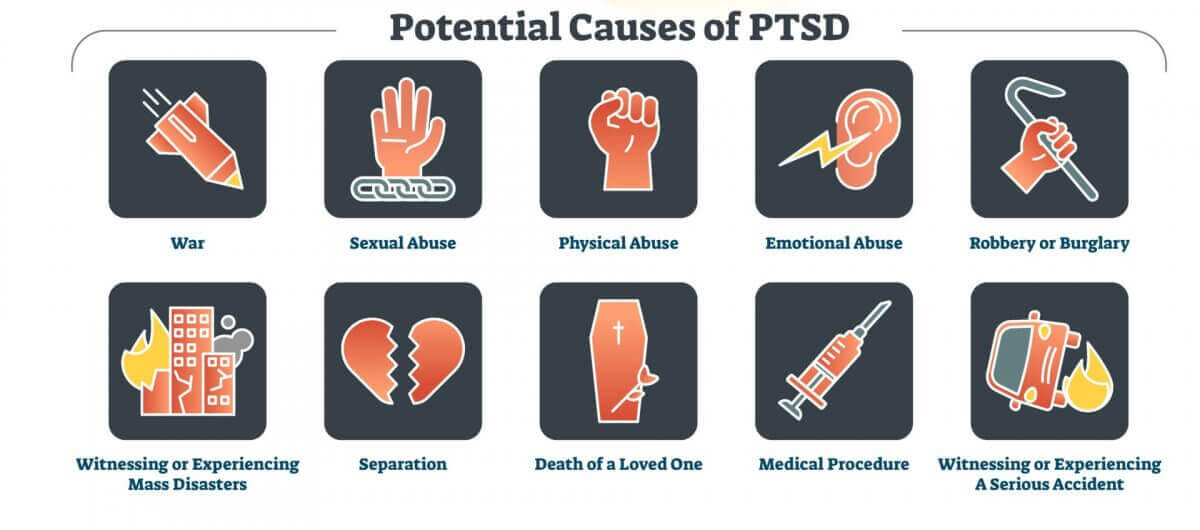
PTSD and Traumatic Brain Injury
PTSD shares a considerable amount of overlap with traumatic brain injury (TBI), and researchers are trying to figure out why. Not only are the two conditions difficult for clinicians to distinguish between, but they also frequently occur together.
A large study of US Army soldiers who fought in Operation Iraqi Freedom reported that 43.9% of the soldiers who had TBI with loss of consciousness also met diagnostic criteria for PTSD. Another study reported that having a TBI doubled the chance of developing PTSD.
Traumatic brain injuries are generally caused by a blow to the head, injuries that pierce the skull and brain, or things such as whiplash that can cause the brain to bump into the skull. Like PTSD, TBI is not limited to combat vets; every year, at least 1.5 million people in the US experience a TBI.
Depending on the severity, TBI can be mild, moderate, or severe. It’s even possible to have a TBI and not even know it! Mild TBIs (mTBI), also known as concussion, can involve the following symptoms.
- Headache
- Dizziness
- Nausea
- Fatigue or drowsiness
- Speech problems
- Sensory issues such as a bad taste in the mouth
- Sensitivity to light or sound
For moderate TBIs, the symptoms above can be more severe and also accompanied by the loss of consciousness.
Most people with mild and even moderate TBI recover within days to months. However, about 15% will show symptoms of post-concussive syndrome a year later. The symptoms include most of the same ones that could have immediately followed the trauma. But it could also include persistent emotional challenges such as mood lability, anxiety and/or depression, and cognitive impairments like mental slowness or memory or concentration issues, like brain fog.
Interestingly, those who have a mild TBI are more likely to develop PTSD than those with more severe brain injuries. The likely reason is that those who experience a more violent blow to the head tend to have amnesia around the traumatic event, ironically sparing them from the flashbacks, nightmares, bad memories, and more that are often caused by PTSD.
What’s the connection?

The same traumatic event can cause TBI, PTSD, or both, especially if the traumatic event involved psychological as well as physical trauma, such as war combat or domestic violence.
One condition can also affect the course of the other. For example, PTSD that develops following a car accident could complicate recovery from brain injuries sustained; conversely, a TBI may block the person’s ability to get emotional closure from the psychological aspects of the event.
How do they cause cognitive issues?
Until recently, researchers didn’t understand exactly what these conditions were doing in the brain, and in particular how they affected cognition.
According to this review, TBI and PTSD represent “brain disorders with disruptions in neural networks that communicate via long axonal pathways through white matter tracts, termed the “connectome.” The connectome is the brain’s “wiring” pattern; the sum total of billions of neurons and the pathways or routes that they use to carry out their function.
Both TBI and PTSD have shown to produce neural inflammation, excitotoxicity, and oxidative stress within the brain. These processes, all of which can affect one another, represent normal functions in the body that, under every day conditions, don’t cause harm. If these functions get pressed into service too often or for too long though, they can kick into overdrive and quickly spiral out of control, leading to cellular damage and physical changes in the brain.
For example, the amygdala is largely responsible for the “raw data” of emotions that arise in the body. But it’s your prefrontal cortex that actually works with the amygdala to regulate emotions. Studies have shown that a critical connection between the prefrontal cortex and amygdala may be broken in brains with TBI or PTSD, which could explain the commonly seen lack of emotional control.
The bottom line
PTSD and TBI can both be debilitating conditions that greatly affect everyday life for those who suffer from them. However, recent research into the neural mechanisms of these disorders has opened the door for the discovery of new treatment options.
Could I have a Traumatic Brain Injury and Not Know It?
As the years go by, many of us chalk up lapses in memory as a side effect of aging. But if you’re also experiencing headaches, trouble concentrating, and thinking clearly, then something more serious may be to blame: a traumatic brain injury. What, a brain injury? Surprisingly, yes. Brain injuries are more common than most people realize, and left unchecked they can wreak serious havoc in your life. Fortunately, the latest scientific advancements, such as hyperbaric oxygen treatment protocol, show promise in helping treat traumatic brain injuries.
According to the Brain Injury Association, more than 2.8 million people sustain a traumatic brain injury (TBI) every year, and TBI-related deaths are highest among older adults. Since symptoms of a traumatic brain injury can sometimes take years to manifest, many people don’t even realize that they have one until problems show up later in life. That’s right: the fall you had in the 1990s could actually be the cause of your headaches and brain fog today.
TBIs can cause all sorts of cognitive problems and can even lead to permanent disabilities if left unchecked. You don’t even need to directly hit your head to obtain one, either. But the good news is that with proper detection, traumatic brain injuries can be treated, including at centers such as Aviv Clinics. That’s why we’ve put together this helpful guide with everything you need to know about TBIs and how to determine if you may have one.
What is a Traumatic Brain Injury?
A traumatic brain injury (TBI) is exactly what it sounds like. It’s a form of brain injury that occurs when an external trauma is inflicted upon the brain. This trauma can impair your brain’s ability to communicate with the rest of your body, and the effects can differ depending on the part of your brain that was injured. Damage can range from mild to severe and there is not always a loss of consciousness.
The most common form of a mild TBI is a concussion, which is caused by a violent shaking or rattling of the brain. Common causes for TBIs include: Sports injuries, Falling off a bike or horse, Military injuries, Being assaulted or struck, Being in a car accident, Falling and hitting your head.
Any kind of scenario involving your brain hitting your skull can cause a TBI, such as whiplash from a car accident. Although the potential for sustaining damage is greater if you were knocked unconscious, you don’t have to lose consciousness to experience negative effects. Even mild brain injuries can cause symptoms to appear in the long term.
TBI symptoms checklist
What are the symptoms of a traumatic brain injury? Just like the severity of a TBI can vary, so too can the severity of the symptoms you experience.
Signs of a concussion or mild TBI include:
– Headaches and dizziness
– Nausea and vomiting
– Changes in sleep patterns
– Confusion or Memory Loss
– Fatigue or lethargy
– Difficulty concentrating
– Difficulty making decisions
– Mood changes like depression or irritability
Although many people feel the effects immediately after sustaining a brain injury, symptoms can show up at any time, even years later. This delay means that many people never make the connection between hitting their head and cognitive problems experienced later in life.
In some cases, a TBI may never be properly diagnosed because the person who sustained it never lost consciousness or never went to the doctor afterward. Many people suffer needlessly because they never realize they sustained a TBI to begin with, and the effects of an untreated TBI can be devastating.
TBIs can even lead to more sensory problems like blurred vision, ringing in the ears (tinnitus), or even difficulty understanding language and communicating properly (aphasia). And because TBIs and dementia can have similar symptoms, it’s important to know what you’re dealing with so that you can receive the proper treatment.
How do you detect a TBI?
There are different ways to evaluate for a TBI. Brain injuries can cause two distinct types of damage: structural and metabolic. Structural damage is caused by physical damage to the brain, such as bleeding. Metabolic damage affects the brain cells themselves. A CAT scan or MRI is the first step to detecting obvious structural damage in the brain. But there can be more subtle damage to your brain that these scans might miss, especially if your injury is years old. This is where more advanced techniques come into play.
Functional MRIs or SPECT scans can detect metabolic damage in the brain tissue.
These scans can reveal improperly functioning brain cells even years after the bleeding has stopped.
From there, your healthcare provider can move forward with treatment options.
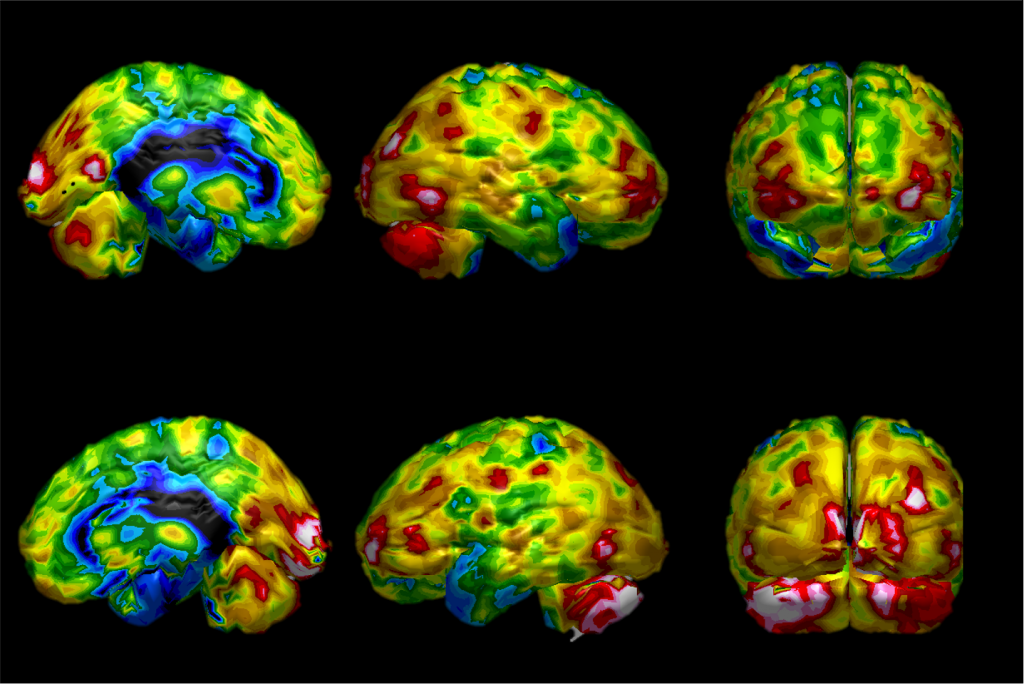
SPECT scan – enables doctors analyze the metabolic activity of portions of the brain
How do you treat a TBI?
One of the most promising treatments for brain injuries involves hyperbaric oxygen therapy (HBOT).
HBOT is a treatment where patients receive oxygen-enriched air in a special high-pressure chamber. The unique hyperbaric protocols were researched and tested for years at the Sagol Center for Hyperbaric Medicine and Research in Israel. They are now available at the Aviv Clinic, Jumeirah Lakes Towers (JLT), Dubai, U.A.E
HBOT has been shown to improve neuroplasticity and lead to the improvement of chronic impairments in patients with mild TBIs, even on brain injuries that are years old. HBOT also induces angiogenesis in the brain, the process by which new blood vessels form from existing ones. These structural changes in the brain can lead to improvements in thinking clarity, cognitive performance and overall quality of life!

Hyperbaric Suite, Aviv Clinics, Dubai.
Conclusion
While the name may sound scary, TBIs are both detectable and treatable, even years after they occur.
With the proper care, you can see improvements to your memory, cognitive function and overall quality of life!
For more information about Aviv Clinic’s personalized program and unique hyperbaric protocol, or to schedule an in person consultation, contact the clinic today.
